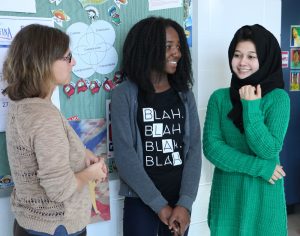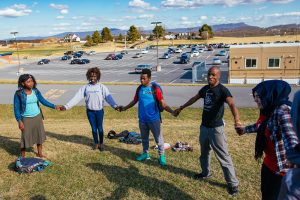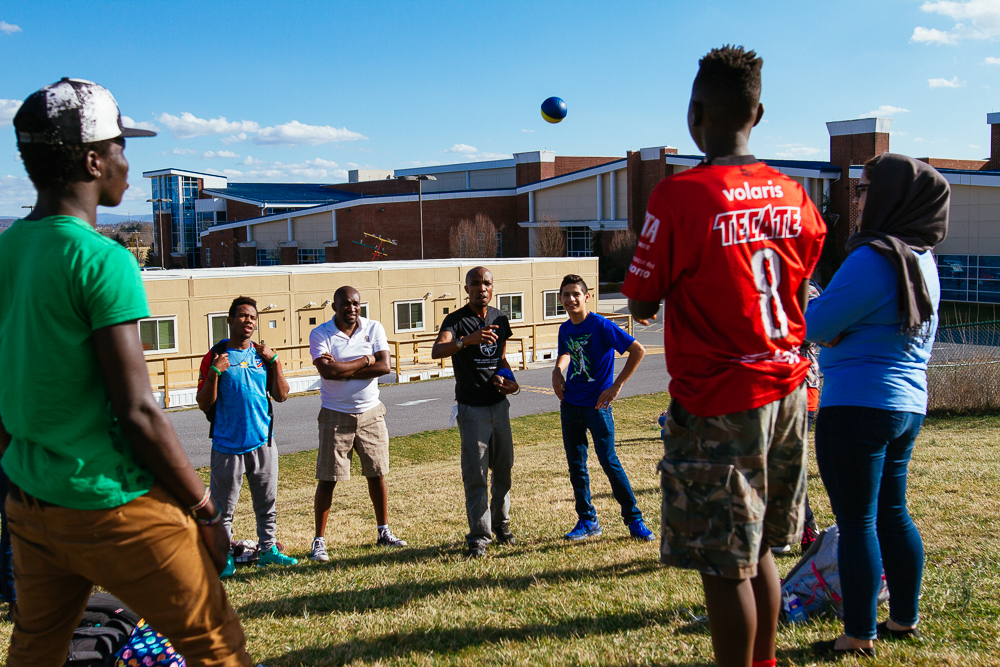For 15 students participating in a resilience training at Eastern Mennonite University, one role-play activity hit close to home.
The small-group skits were focused on inviting students to learn how their actions might be a result of an emotional response: how, for example, teasing Pakistani refugee Hayat Zahra, 16, about her hijab might be a result of their own discomfort in a new American culture.
“That was hard,” Zahra said later. Though the situation was only acting, her emotional response was visible to those around her. The students, refugees from Africa and the Middle East who are members of a leadership training program, were then able to talk about how words can hurt and how such hurt might cause other negative behaviors.

Harrisonburg High’s Peer Leaders program is a grant-funded project led by James Madison University’s Center for International Stabilization and Recovery (CISR), and involving partners Church World Service (CWS), Eastern Mennonite University and Harrisonburg High School. Funds for the 2016-17 academic year were provided from JMU’s Faculty Senate Vision Mini-Grant program.
The program began in spring 2015 with initial funding from CWS and the Virginia Department of Behavioral Health and Developmental Services.
Teens are valued leaders
Though they may not have mastered English and may not realize their own influence, high school-age refugees are vital contributors and leaders within the high school community, said Rebecca Sprague, of CWS. “Building their knowledge about the school and community helps them be a resource to new refugees and their family members, as well as to our community. There are all different ways to be a leader, including helping to decide what kind of welcoming community the high school will be.”
Self-advocacy is another goal, said Laura Feichtinger-McGrath, ESL coordinator at the high school, “both for themselves and their peers … recognizing they can’t change the traumas of their past, and they all have traumas, but also not allowing their past experiences to cripple them or close doors to opportunities.”
Approximately 40 students participate in the program, all of whom have come to the Unites States to escape war, persecution or other dangers. Not every student comes to every weekly meeting, or every enrichment opportunity, Feichtinger-McGrath said.
Swahili speaker Kajungu Mturi, a graduate student at EMU’s Center for Justice and Peacebuilding from Tanzania, and Felix Kioko, a Kenyan earning a second degree at EMU, facilitate the group. Rabab Hassan, an Arabic-speaking teacher’s assistant from Iraq, and Valentina Sokolyuk, home-school liaison, lends her language skills. Paige Ober, CISR’s representative, attends each meeting and planning session.
“We want to develop a rooted sense that they are a part of the community here,” Feichtinger-McGrath said. “They have around them lots of adults with different perspectives and backgrounds that have their best interests at heart.”

Learning about themselves and moving between cultures
Monthly sessions alternate between providing information about community and school opportunities and group activities off-campus.
EMU resources were also tapped during a fall conflict and communication training with a CJP team that included Professor Johonna Turner, Practice Director Amy Knorr, Mturi and fellow graduate students Diana Tovar and Jalal Maqableh, and alumnus Jacques Mushagasa. In a day soon after the elections, when many questions had begun to surface, the group from CJP facilitated learning about “acting in, acting out, and acting with” to help students explore their questions and strategies for engagement.
The February workshop was focused on learning how the body responds to stress and how those responses can lead to unhelpful behaviors. Gloria Bafunye, a ninth-grader from the Democratic Republic of the Congo, explained it as the difference “between head and heart, how sometimes you think something and your body is because of that.”
Katie Mansfield, director of the Strategies for Trauma Awareness and Resilience (STAR) program, facilitated the learning experience. She said she was inspired by the students’ sensitivity, insights and questions.
Mansfield typically works with adults. For this day with 30 high-schoolers, she drew upon her first experiences in peace education with an organization called Peace Games, which involved playing games and asking questions to invite young people to learn from their own embodied experience. Mansfield offered arts-based activities, small-group sharing and team-building experiences, and joined in when a student started an impromptu dance session during the lunch break.
Both Bafunye and Zahra mentioned the lunch-time dancing as a highlight, one occasion when even the newest student, who had only been at the high school for three days and spoke almost no English, enjoyed himself.

How beautiful is this! It brings me to tears. After spending three years in Afghanistan as well as other countries of the world, this kind of initiative is very powerful and needed. Many thanks to each of you involved in this kind of project to bring us all together.